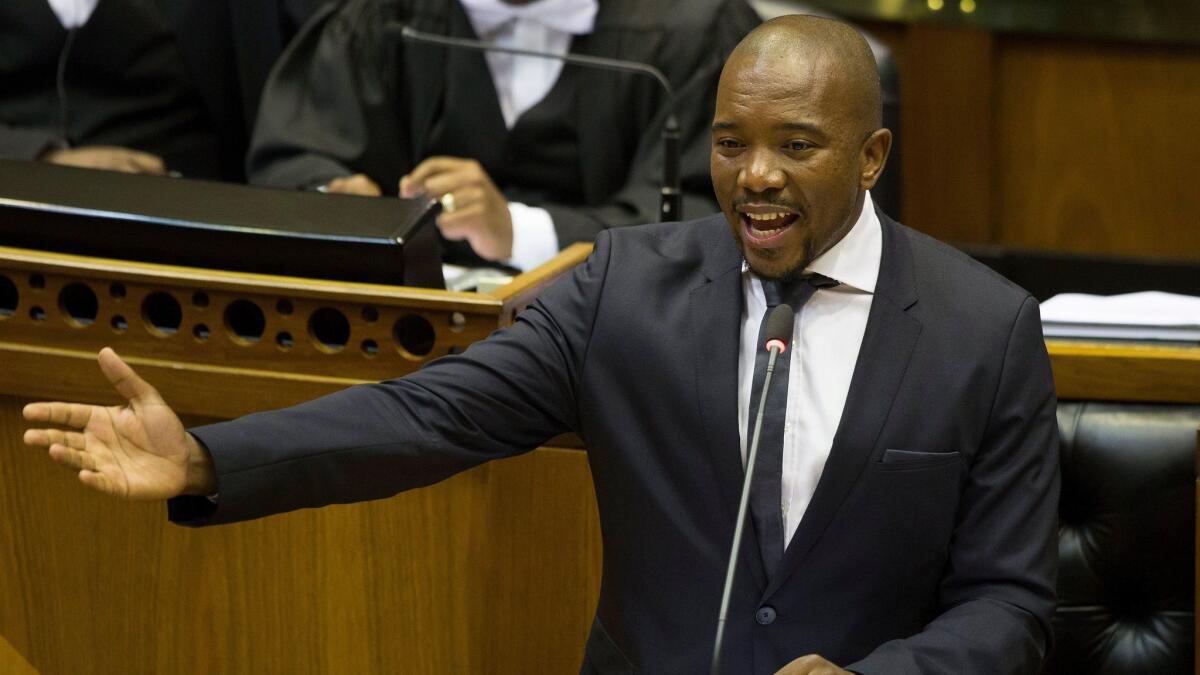Under mounting criticism, South African President Jacob Zuma survives another no-confidence vote

Amid increasing calls for his resignation, South African President Jacob Zuma survived a no-confidence vote in parliament Thursday as his party rallied around him.
Former government ministers, businessmen and activists accuse the president of incompetence and corruption that have wrecked the economy and the government bureaucracy. The last blow against him was a report from an independent watchdog criticizing his links to a powerful business family.
“We can choose to sit back while our state is captured by the greedy and the corrupt or we can stand up against state capture,” said Mmusi Maimane, the leader of the opposition Democratic Alliance, making the case to parliament Thursday to boot Zuma from office with a no-confidence vote. “We can choose to elevate one man above the law or we can fight for every person to be equal before the law.”
The debate at times grew raucous as members of Zuma’s party, the African National Conference, which holds a wide majority in parliament, rushed to his defense.
Nomvula Mokonyane, the minister for water, accused Maimane of working “to protect the interests of the white minority” and called him a “black face.”
“This motion against President Zuma, in whichever way it may be put, seeks to have us ignore the fact that the majority remains without access to land and remain spectators in an economy largely controlled by minority elite that is opposed to transformation, masquerading and led by a black face,” she said.
The motion was easily defeated, 214 to 126. It was the fifth time since 2012 that Zuma has faced a no-confidence vote and the fifth time he survived, with votes always running along party lines.
Gwede Mantashe, the ANC secretary general, said this week that no-confidence motions had become an “annual and frivolous ritual, which is fast losing its meaning.”
Zuma has been embroiled in controversy since before taking office in 2009. This year has brought new problems.
In March, the nation’s highest court ruled that he had violated the South African Constitution by failing to repay state money spent on personal upgrades to his home. He has since reimbursed the state.
The watchdog report, released last week by the public protector, who reports to parliament, found that Zuma may have breached government rules on ethics and that a company in which his son held an interest may have committed fraud. It called for a judicial inquiry into whether crimes had occurred.
The report included testimony from current and former government officials that the Guptas, a powerful business family that is close to Zuma, had hired and fired government ministers, offered bribes and unfairly benefited from government contracts.
The ANC, which has won every national election since the country’s first democratic vote in 1994 with more than 60% of the vote, has stood behind Zuma, whose second and final term ends in 2019.
Still, there are voices of dissent. Thabo Mbeki, who was ousted as president by the ANC in 2008, joined the chorus of criticism on Tuesday, saying South Africa was in a state of despair
“The hard reality we face today is that our country is trapped in a general and deepening political, economic and social crisis which has, for many, begun to turn what was an age of hope into an age of despair,” Mbeki said in a speech to businessmen decrying corruption and abuse of political power.
Mathews Phosa, a former ANC treasurer, told local media Thursday that Zuma had no integrity or shame and should resign “because he is the elephant in the South African room.”
South Africa has slipped into dire economic straits under Zuma, with stagnant growth, the looming danger that its credit rating could be downgraded to junk status, state enterprises requiring government bailouts, and unemployment at 26.7% and nearly double that among young people.
Protests at universities across the country in recent months have seen facilities burned to the ground and campuses closed.
Twitter: @RobynDixon_LAT
More to Read
Start your day right
Sign up for Essential California for news, features and recommendations from the L.A. Times and beyond in your inbox six days a week.
You may occasionally receive promotional content from the Los Angeles Times.






